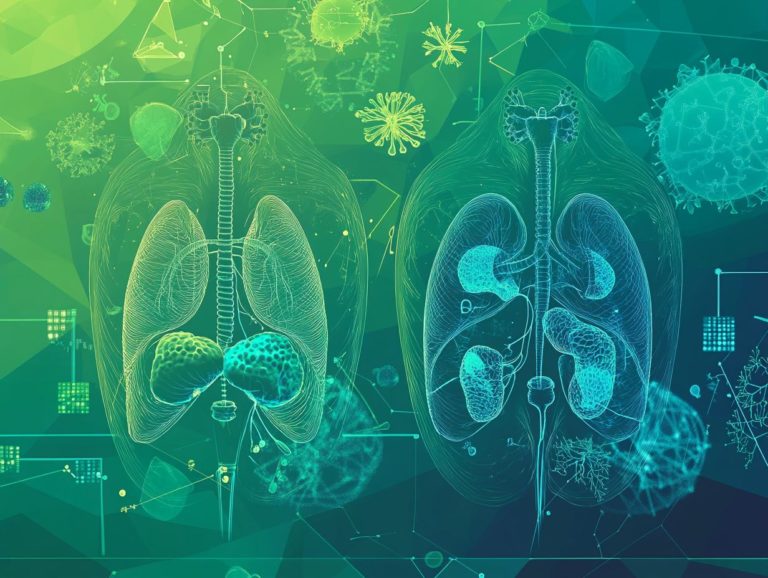How to Recognize Detox Symptoms
Detoxification is a natural process your body uses to clean out harmful substances and purge toxins. However, it often presents a variety of symptoms, both physical and emotional.
Grasping the true essence of detox is paramount in navigating this recovery journey effectively. This guide will illuminate the common symptoms you might encounter, including withdrawal symptoms, offer effective management strategies, and advise you on when to seek medical assistance, ensuring you can detox safely and confidently!
You will discover tips for a gentle detox, designed to make your experience as seamless and pleasant as possible, incorporating holistic approaches and detox diets.
Contents
Key Takeaways:

Understanding Detoxification
Detox stands as a vital first step in your recovery journey if you re grappling with substance abuse, particularly in drug detox and alcohol detox. This process involves carefully removing harmful substances from your body, with a particular emphasis on addressing detox from drugs and alcohol.
An effective detox can dramatically enhance your health and wellbeing, laying a solid foundation for subsequent therapeutic interventions, medication-assisted treatment, and rehabilitation. Often, this journey requires medical supervision in a safe place with doctors and nurses who can help you manage withdrawal symptoms while ensuring you receive the support you need throughout your detox experience.
What is Detoxification?
Detoxification is the medical process designed to remove toxic substances from your body, especially if you’re facing challenges with substance abuse.
This essential procedure aims to restore your health by eliminating harmful substances like alcohol, opioids, and stimulants that have built up due to extended use. The detox process typically takes place in a supervised medical setting, where healthcare professionals closely monitor withdrawal symptoms and provide the necessary interventions to ensure your safety and comfort. For those looking to enhance their detox journey, learning how to start a detox journal can be incredibly beneficial.
These methods can vary, often including tapering off medications, nutritional support, and psychological counseling, all customized to the specific substance you’re dealing with and your unique needs.
The importance of detox can t be overstated; it lays a vital foundation for further treatment approaches, creating a stable environment that fosters recovery and promotes long-term success.
Common Detox Symptoms
During the detox process, you may encounter a variety of common symptoms that can fluctuate significantly in both intensity and duration, especially when withdrawing from substances such as alcohol and opioids, and due to cravings management.
Physical Symptoms

During detox, you might experience a range of physical symptoms, such as body aches, fatigue, and excessive sweating. These sensations are quite common as your body kicks into gear with its natural cleansing processes, often triggered by the release of stored toxins and withdrawal from various substances, including chronic drug use.
You may find that mood swings and anxiety symptoms accompany these physical discomforts, amplifying the challenges you face during this crucial recovery phase. Recognizing these difficulties is essential, as they can significantly impact your motivation and the overall success of your healing journey, especially when faced with withdrawal management.
Stay hydrated to help ease discomfort! Not only does it support your body in flushing out toxins more effectively, but it also helps alleviate symptoms like headaches and fatigue, which can be exacerbated by insufficient nutrient intake. This simple step can pave the way for a smoother recovery experience and contribute to your health improvement. To further enhance your well-being, consider incorporating detox into your daily routine.
Emotional Symptoms
Emotional symptoms during detox can be quite challenging, often manifesting as mood swings, anxiety, and cravings that can significantly affect your mental health, requiring emotional support and professional guidance.
These emotional ups and downs can create a rollercoaster effect, making it tough to concentrate on long-term recovery goals and manage cravings. As anxiety levels rise, those cravings can intensify, making them feel nearly impossible to resist and presenting significant hurdles to your progress.
Engaging in therapeutic interventions like mindfulness meditation, cognitive-behavioral therapy, and support groups can be incredibly beneficial in helping you navigate these turbulent emotions and enhance your mental balance. These strategies not only equip you with effective coping mechanisms but also cultivate a sense of community, vital for emotional support during your recovery. Sharing your experiences and challenges with others can greatly reduce feelings of isolation and helplessness, making your journey just a bit easier.
Managing Detox Symptoms
Managing detox symptoms is crucial for ensuring a comfortable and safe detoxification process, particularly when focusing on withdrawal management. This journey requires a blend of natural remedies and therapeutic interventions to effectively tackle cravings, emotional distress, and health risks associated with detox.
By taking a proactive approach, you can navigate this phase with greater ease and support your overall well-being.
Natural Remedies and Strategies
Natural remedies and strategies play a pivotal role in managing detox symptoms, with a strong emphasis on cravings management, hydration, and enhancing overall health through effective body detoxing techniques.
By incorporating specific natural remedies and detox diets, you can address your detox symptoms more effectively. Hydration is key; drinking plenty of water will help flush out toxins and keep your body functioning optimally. Replenishing nutrients through whole foods—think leafy greens and vibrant fruits—provides essential vitamins and minerals that are crucial for your recovery, counteracting potential nutrient deficiencies. Additionally, learning how to create a detox ritual can amplify your efforts. Herbal supplements like milk thistle and dandelion root are particularly beneficial, known for their liver-supporting properties that contribute to a smoother detoxification process.
It s essential to blend these natural strategies with therapeutic interventions, such as counseling or mindfulness practices, to cultivate a holistic approach that supports both your physical and emotional well-being during this transformative period, especially considering the impacts on the nervous system.
When to Seek Medical Help

Understanding when to seek medical assistance during the detox process is crucial for maintaining your safety and effectively managing any severe detox reactions that may arise unexpectedly, especially those related to substance use disorder (SUD). It s an essential aspect of ensuring a smoother and more secure journey toward recovery.
Signs of Severe Detox Reactions
Signs of severe detox reactions can manifest as intense withdrawal symptoms, including hallucinations, seizures, and debilitating anxiety conditions that demand immediate attention from healthcare professionals.
These symptoms often serve as a clear indication that you are experiencing significant distress, potentially jeopardizing your health and requiring immediate attention from healthcare professionals. Additional signs may include extreme physical discomfort, a rapid heart rate, and mood swings. Recognizing these reactions is essential; timely medical support can pave the way for safer detox protocols and effective symptom management. For those looking to enhance their detox process, understanding how to use meditation for detox benefits can ensure that emotional support is also addressed.
Early intervention not only alleviates physical suffering but also protects against more severe complications, ensuring that your recovery journey continues with reduced risk and enhanced emotional stability.
Preventing Detox Symptoms
Preventing detox symptoms is crucial for a smoother detoxification journey and minimizing health risks. You can achieve this by implementing a blend of safety measures and holistic strategies, ensuring your body receives the support it needs during withdrawal.
Tips for a Gentle Detox
Implementing tips for a gentle detox can ease withdrawal discomfort. Use a whole-body approach that nourishes both your body and mind.
This journey often starts with thoughtful dietary changes. Adding fresh fruits, vegetables, and whole grains enhances your body’s natural cleansing processes.
Stay well-hydrated. It helps flush out toxins, prevents excessive sweating, and keeps your energy levels steady.
The emotional aspect is equally important. Create a supportive environment through friends or professional guidance to help manage cravings.
Frequently Asked Questions

What are detox symptoms?
Detox symptoms are physical, mental, and emotional changes. They occur when your body eliminates toxins.
How can I tell if I am experiencing detox symptoms?
Common signs include headaches, fatigue, and mood swings. These reflect your body’s response to withdrawal.
What causes detox symptoms?
Detox symptoms result from the release of stored toxins. This happens during a detoxification process, such as a cleanse or dietary change.
How long do detox symptoms last?
The duration varies based on individual health and detox intensity. Symptoms may last from a few days to a few weeks.
Are detox symptoms a sign that the detox is working?
Yes, they indicate your body is effectively eliminating toxins. Consult healthcare professionals if symptoms are severe.
What can I do to alleviate detox symptoms?
Stay hydrated, manage cravings, and get plenty of rest. Incorporating gentle exercises, like yoga, can also help.






